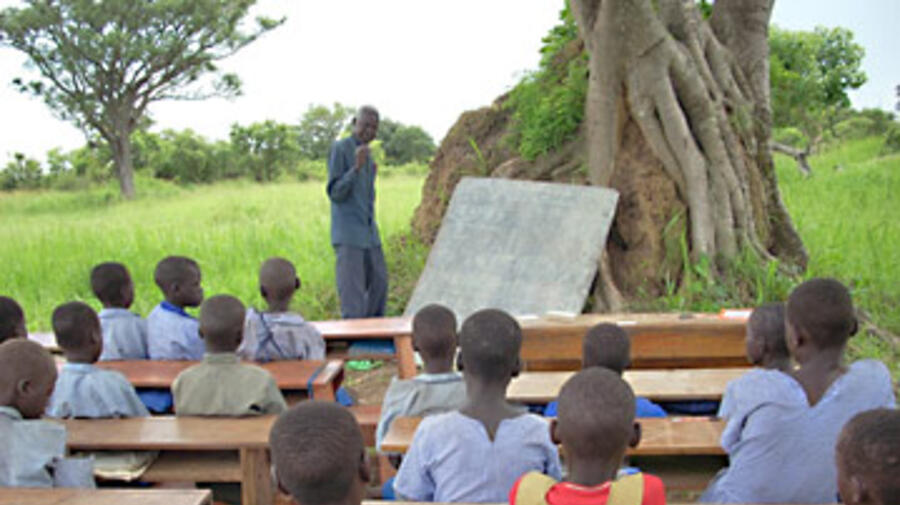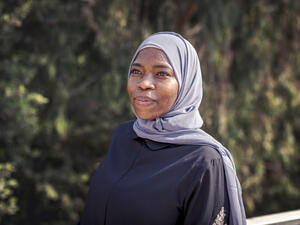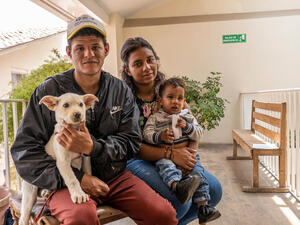UNHCR restores 134 primary schools in northern Uganda
UNHCR restores 134 primary schools in northern Uganda

Some classes in Awak Kol Primary School are still conducted under trees because there are not enough classrooms.
AWAL KOK, Uganda, June 23 (UNHCR) - After six years, the village of Awal Kok in northern Uganda finally has a primary school again. Dozens of other schools are also moving back to their original sites with the help of the UN refugee agency as peace returns to the north after two decades of conflict.
The school at Awal Kok was relocated to a site 25 kilometres away in 2002 when fighting between Ugandan government troops and the rebel Lord's Resistance Army swept through the area and forced people to flee for their lives. But hundreds of thousands of internally displaced people have returned home since the rivals started peace talks two years ago.
Many are returning to villages left devastated by fighting and neglect. Infrastructure needs to be rebuilt and basic services restored, including health and education. UNHCR has already supported the restoration of 134 schools, including the one at Awal Kok, in the districts of Gulu, Amuru, Pader and Kitgum.
When a UNHCR truck laden with school furniture and supplies rolled up at Awal Kok Primary School four months ago, the place was a mess. The single storey building was empty and lacked windows and doors. Outside in the play areas, the jungle roamed free.
But eager pupils and their parents were on hand to unload desks, chairs and other school equipment. "We are very happy to be back," Headmaster Sylvesto Okwera said at the time as he mucked in with the others.
Today, the place has been transformed. The bush has been cut back and the compound cleaned, while some of the windows and doors have been fixed. Two new water tanks have been installed and classes are back in full swing.
"It's much easier to control the pupils because we are the only school here. In our previous location we shared the same compound with six other schools with thousands of pupils," said Sylvesto Okwera, the maths teacher. "That made it difficult to maintain discipline as sometimes we could not even identify our pupils because some of the schools had the same colour uniform," he added.
During the years of unrest, which left tens of thousands of civilians dead, almost 2 million fled their homes and found shelter in sites and settlements for internally displaced people. Here, they reopened their village schools. Awal Kok Primary School is one such example.
With the return of relative peace, many people want to return to their villages and restore basic services. But the district authorities have neither the resources nor the cash to help everyone and many have approached humanitarian organizations such as UNHCR.
"The first request for the physical relocation of schools that we got was from the community members themselves," said Sisse Kristensen, a community services officer at the UNHCR sub-office in Gulu district, in which Awal Kok is located. "When we realized that there were many such requests from the community, we sat down with the district to develop a strategy on how this could be done."
Oguta Primary School in Pader district has also come home - a rural hilltop far from the hustle and bustle of camp life that pupils and teachers said distracted them. When the former pupils fled their home in 2003 and found shelter in Pajulle, 10 kms away, they had to share a compound with 15 other primary schools.
"Our present environment is what the environment of a school should be like. It's quiet, peaceful and conducive for learning," said Washington Lagoro, the school head.
"I like it here because it's near home and there is a lot of space where I can play, unlike in the camp," added Vicky Apeyo. Like most pupils in the school she has a dream. "When I grow up I want to be a tailor. And the realization of my dream has to begin from here."
The reopening of schools in formerly deserted villages is a welcome sign, even though challenges remain as infrastructure is minimal. The communities are certainly grateful and some have shown their gratitude by building accommodation for the teachers of their children.
By Moses Odokonyero in Awal Kok, Uganda








